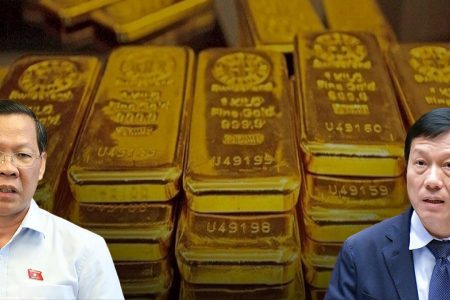On April 1, Vietnam began to implement social isolation, all economic activities would be delayed. The first people to be affected are the working class, middle class and small businesses, which are the backbone of the economy.
“Brother, will I be counted as dead due to epidemics if I starve?” A barber sadly asked me. The question of a barber who hasn’t finished high school is a common concern for tens of millions of Vietnamese people today.

To answer that question fully is not easy. Of course, if you suspend all business activities for 1-2 weeks, it is not enough for people to starve to death, but the disease is likely to persist and the economy is suffering from a precarious fate.
As it is not known when the crisis will end, public policy issues are again concerned and discussed.
For many Vietnamese, they only vaguely know macroeconomic concepts and discuss government policies that are even considered restricted areas.
But in a simple, simple way, the barber’s question raises an urgent problem: What is the Vietnamese government’s policy to support people to overcome the difficult period of disease?
Looking at the social assistance and economic rescue that advanced countries launched to support the people of their country, especially the unemployed, what do Vietnamese people think?
Australian Prime Minister Scott Morrison decided to double the unemployment benefits for Australians in six months, who he said would suffer the first economic consequences of the Covid-19. “We will support those most vulnerable to the effects of the crisis,” he said. This support package alone is worth up to $14 billion.
The French government mobilized more than 300 billion euros in liquidity support for companies affected by the economic impact of the Coronavirus outbreak.
France rescues businesses and workers with three separate financial programs, two of which allow the Bpi France public investment bank to provide government guarantee for commercial and credit loans. The remaining program is a direct aid to companies by allowing the bank to quickly provide funding to any unit in need.
The British Government is offering £330 billion to support small businesses and people with lower incomes. Accordingly, the amount of nearly $400 billion, equal to 15% of the UK’s GDP will include many loans to help small and medium enterprises avoid bankruptcy due to losing customers and bank debt. Any business that needs access to this money will be able to receive government-backed loans on preferential terms through the Bank of England.
In Germany, a support package worth up to 600 billion euros was also immediately offered to support people and businesses.
In Asia, Japan injected $14.2 billion into the market in a move considered “unprecedented” to stimulate large-scale financing.
Singapore also launched urgent economic bailout packages worth about $38 billion, accounting for 11% of the country’s GDP.

Nearly Vietnam, the country in which many Vietnamese are still at a similar level of development or not too superior to Vietnam, Indonesia has also announced the first stimulus package worth 120 trillion Rupiah ($8.1 billion)
Production workers who earn less than $13,000 a year will also enjoy the new tax reduction.
Of course, the comparison of developed countries’ policies with Vietnam is lame because of the size of the economy and the level of development.
But why must Vietnamese people be poor?
The first reason came from the economic monopoly and loss of state-owned corporations in the economic field, which led to the constraint of private development and loss to society.
Since opening the market in 1992, Viet Nam’s development figures have been mostly highlighted through GDP growth. However, GDP does not reflect the quality of assets and services created, nor does it speak about the effectiveness of increasing the well-being of the entire people.
The country’s industrialization and opening is sadly an opportunity for a corrupt leadership, through state-owned corporations, to enrich itself by selling Vietnam’s resources and minerals to more developed countries.
According to the State Audit of 2018, the accumulated loss to the end of 2017 of PetroVietnam Construction Joint Stock Corporation was VND3,377 billion; Petrochemical and Petroleum Fiber Joint Stock Company has loss of VND1,780 billion, and Dung Quat shipbuilding industry suffered a loss of VND1,159 billion while Saigon Agriculture Corporation (Sagri) invested in 8 joint-venture companies, associates and other long-term investments, and have accumulated losses of VND315 billion. Ho Chi Minh City State Financial Investment Company (HFIC) also invested in seven companies and accumulated losses of VND105 billion. Meanwhile, Vietnam Electricity (EVN) reported its loss of VND 547 billion. When it comes to the parent company, there are groups holding tens of trillion dong of bad debts like PVN’s, up to VND11,368 billion dong. The group also lost $773 million for 24 projects abroad.
State-owned corporations are likened to the economy, enjoying preferential policies and having access to large credit. However, this group constantly makes losses, declares losses and wastes resources of society. So right at the beginning of the budget was not guaranteed.
The second reason for the depletion of budget is due to the situation of ineffective withdrawal and public investment.
In the period of 2013 to 2019, if the budget revenue increases by VND572 trillion, the budget expenditure increased by over VND600 trillion, totaling more than VND1,660 trillion.
This means that although the revenue increases, the rate of increase in spending is even higher. If calculating in 2019 alone, the revenue is not enough to cover the expenditure, the national budget deficit is VND222 trillion, accounting for 3.6% of GDP.
In 2018, the budget deficit was VND204 trillion, accounting for 3.7% of GDP and it is expected that the deficit will continue to be VND234 trillion in 2020, but with the current crisis situation, the deficit will be much higher.
Meanwhile, the great projects worth tens to hundreds of trillion dong are continuously failing, not creating welfare for the society but also causing many consequences for the next stage of development.
In the field of Transportation, Ho Chi Minh City Urban Railway and Cat Linh – Ha Dong Railway are still under construction, it is not known exactly when it will be put into operation.
If Metro Line 1 moves the scheduled operation date to the end of 2021, then Metro Line 2 must move until 2026 and the project management representative still has to admit that “the progress of the project is very low.” Cat Linh – Ha Dong is even worse than before it has been degraded.
General Secretary and President Nguyen Phu Trong emphasized “continuing the fight against corruption and negative actions with determination and perseverance,” but when the Communist Party is the only political party in the country, the corruption will not never been stopped and it will consume all the country’s resources.
In the Industry and Trade sector, the prominent projects with big losses are Ha Bac Fertilizer Plant, from 2016 to 2019, about VND2.7 trillion. As for the Ninh Binh fertilizer factory, by the end of 2018, the cumulative loss was nearly VND5 trillion, the state equity reduced by VND2.6 trillion. A series of other projects have stagnated, dispute disputes and stopped production.
Both of the two causes of budget depletion in Vietnam have a common denominator, a poor governance mechanism. In Vietnam, interest groups are grabbing the country’s resources. Only they have the right to get access to the state capital and support programs while the working class has nothing.
Privileged groups have used their large access to credit to control economies across different industries.
In the current legal framework, even if the Vietnamese government wants to launch a subsidy package for the poor, it will be difficult for them to do so, which happened in 2015 on a VND30 trillion housing support credit package.
This pandemic has exposed the dark side of the social operating model as well as highlighting the fact that the country is lacking internal resources.
Although the Ministry of Health has made great efforts in the fight against epidemics, such efforts are not enough to compensate for the limitations of national resources, which have only been methodically grabbed by certain groups of state officials and their relatives.
After 30 years of opening the national economy toward market economy, the leaders of Vietnam are facing the problem posed in subsidy period: innovation or death. The pandemic will pass, it is important for Vietnam’s leadership to have the courage to recognize and overcome the weaknesses of the country or not.
Will Vietnam continue to be poor or will it change to become more prosperous?
Thu Thuy from Hochiminh city – Thoibao.de (Translated)





























